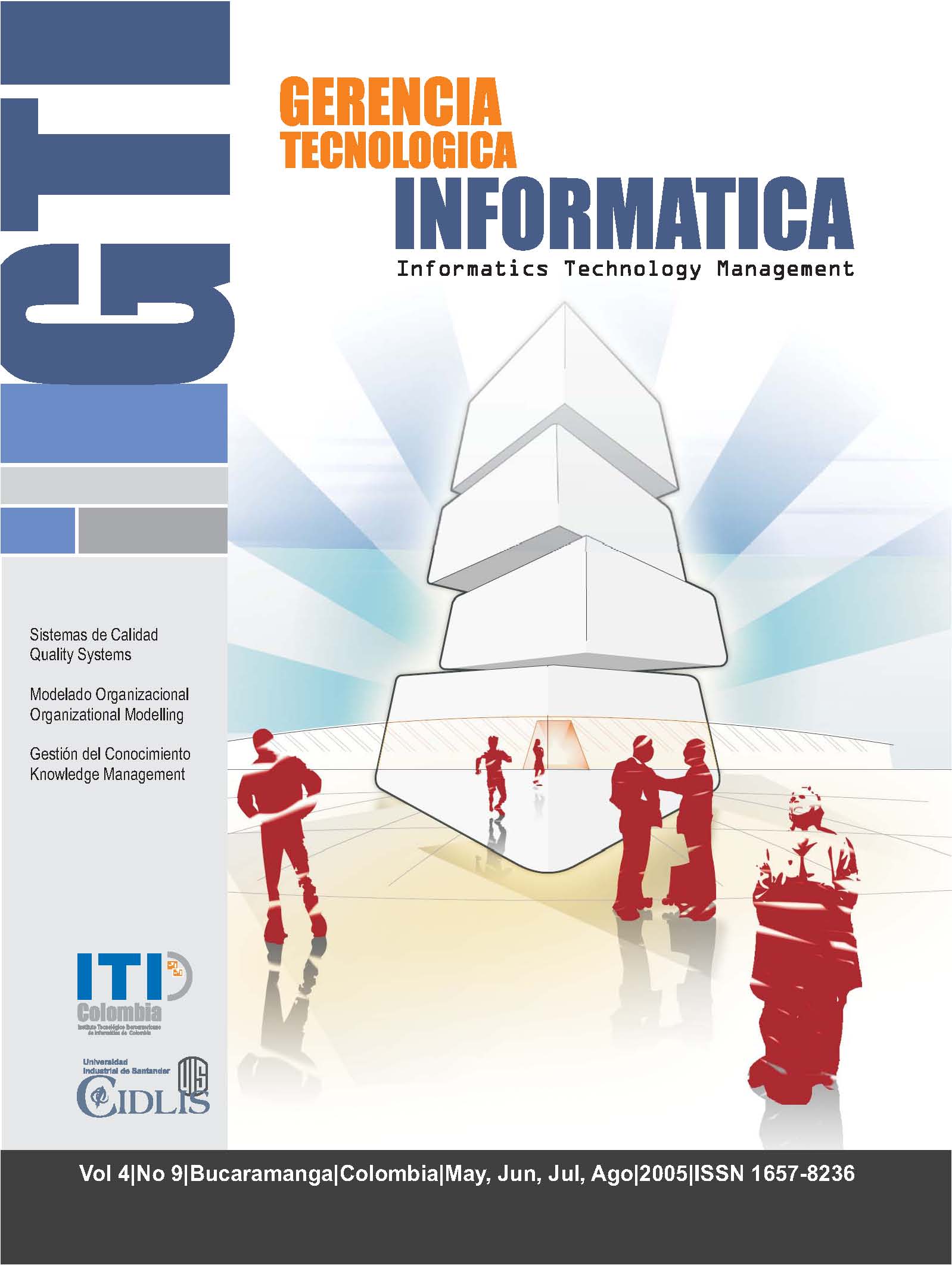EL APRENDIZAJE INDIVIDUAL EN LA GESTIÓN DEL CONOCIMIENTO
How to Cite
Abstract
RESUMEN
El aprendizaje organizacional y la gestión del conocimiento son campos de investigación académica y de práctica profesional con un desarrollo relativamente reciente. En los últimos años se han planteado, desde diversas disciplinas, modelos teóricos explicativos del fenómeno. Una de las propuestas más influyentes ha sido la de Crossan, Lane y White (1999), según la cual la transferencia del conocimiento organizacional pasa por cuatro procesos (intuir, interpretar, integrar e institucionalizar) en dos direcciones: desde el individuo hasta la organización (feed forward) y desde la organización hasta el individuo (feedback). En este artículo se hace una revisión conceptual de cómo ocurre el aprendizaje individual y su relación con la generación transferencia y gestión del conocimiento organizacional. Adicionalmente se presenta una propuesta de mejoramiento de la propuesta de Crossan, Lane y White (1999), fortaleciendo conceptualmente el nivel individual del modelo, soportado en la teoría social cognoscitiva de Bandura (1982, 1986). El resultado es una integración del concepto de capacidades humanas y el de subprocesos de aprendizaje, que permite una comprensión mayor del aprendizaje humano. De esta forma se adiciona al aprendizaje por intuición, procesos cognoscitivos relacionados con el aprendizaje consciente Finalmente se recomienda que toda iniciativa de aprendizaje organizacional y de gestión del conocimiento incorpore de manera explícita el aprendizaje individual. Se concluye que sin aprendizaje individual existe el riesgo que no exista gestión del conocimiento sino sólo gestión de información.
PALABRAS CLAVES
Gestión del conocimiento
Aprendizaje organizacional
Modelos teóricos
Aprendizaje individual
Teoria Cognoscitiva Social
ABSTRACT
Organizational learning and knowledge management are academic research and professional practice fields with arelatively recent development. In the last years several theoretical models of the phenomenon have been developed since diverse disciplines. One of the most influential proposal has been presented by Crossan, Lane and White (1999), according to which knowledge transference occurs through four processes (intuiting, interpreting, integrating and
institutionalizing) in two ways: From the individual to the organization (feed forward) and from the organization to the individual (feedback). In this article a theoretical review of how individual learning occurs is done, and its relation with generation, transference and management of organizational knowledge. Additionally an improvement proposal of the Crossan, Lane and White (1999) model is presented, particularly at the individual level, adding to intuition, concepts from the cognitive social theory of Bandura (1982, 1986). The result is an integration of human capacities and learning subprocesses concepts to the model, allowing a better comprehension of the human learning. Finally it is recommended that every initiative of organizational learning
and knowledge management may consider in an explicit way the individual learning process. It is concluded that without individual learning the risk that organizations have is to do management of information without knowledge management.
KEYWORDS
Knowledge management
Organizational learning
Theoretical Models
Individual learning
Social Cognitive Theory
Downloads
References
- Argote, L. Knowledge basis for competitive advantage in firms. Organizational Behavior and Human Decision Processes, 82, 150-169, 2000.
- Argyris, C. & Schön, S. Organizational learning: A theory in action perspective. Reading, MA: Addison-Wesley, 1978.
- Bandura, A. Teoría del aprendizajesocial. Madrid: EspasaCalpe, 1982.
- Bandura, A. Social foundations of thought and action: A social cognitive theory. Englewood Cliffs, NJ: Prentice-Hall, 1986.
- Cabrera, A., Cabrera, E. Knowledge sharing dilemas. Organization Studies, 23, 687-710, 2002.
- Cangelosi, V. & Dill, W. Organizational learning: Observations toward a theory. Administrative Science Quarterly, 10 (2), 175-203, 1965.
- Castañeda, D. I. Estado del arte en aprendizaje organizacional, a partir de las investigaciones realizadas en Facultades de Psicología, Ingeniería Industrial y Administración de Empresas en Bogotá, entre los años 1992 y 2002. Acta Colombiana de Psicología, 11, 23-33, 2004.
- Castañeda, D. I., y Pérez, A. ¿Cómo ocurre el aprendizaje individual en el aprendizaje organizacional? Una revisión del modelo Crossan, Lane y White. Revista Interamericana de Psicología Ocupacional, en prensa.
- Chow, Ch., Deng, J., y Ho, J. The Openness of knowledge sharing within organizations: A comparative study of the United States and The People´s Republic of China. Journal of Management Accounting Research, 12, 65-95, 2000.
- Crossan, M. M. & Berdrow, I. Organizational learning and strategic renewal. Strategic Management Journal, 24 (11), 1087-1105, 2003.
- Crossan, M. M., Lane, H. W. & White, R. E. An organizational learning framework: From intuition to institution. Academy of Management Review, 24, 522-537, 1999.
- Cummings, J. Knowledge sharing: A review of the literature. Washington, D.C.: The World Bank, 2003.
- Cyert, R. & March, J. A behavioral theory of the firm. Englewood Cliffs, NJ: Prentice Hall, 1963.
- Davenport, T. y Prusak, L. Conocimiento en acción. Sao Paulo: Prentice Hall, 2001.
- Easterby-Smith, M. Y Lyles (Ed.) The Blackwell Handbook of Organizational Learning and Knowledge Management. Blackwell Publishing, 2003.
- Easterby-Smith, M., Crossan, M. & Nicolini, D. Organizational learning debates: Past, present and future. Journal of Management Studies, 37 (6), 783-796, 2000.
- Gammelgaard, J., Husted, K., y Michailova, S. Knowledge sharing and post-acquisition integration failure. Center for Knowledge Governance (CKG) working paper, 6, 2004.
- Husted, K., Michailova, S., Diagnosing and fighting knowledge sharing hostility. Organizational Dynamics, 31 (1), 60-73, 2002.
- March, J. G. Exploration and exploitation in organizational learning. Organization Science, 2, 71-87, 1991.
- Nonaka, I., Takeuchi, H. La organización creadora de conocimiento. Título original The knowledge creating company (1995). México: Oxford, 1999.
- Peluffo, M. Y Contreras, E. Introducción a la gestión del conocimiento y su aplicación al sector público. Santiago de Chile: CEPAL-ECLAC-ILPES, 2002.
- Szulanski, G. Exploring internal stickiness: Impediments to the transfer of best practice within the firm. Strategic Management Journal, 17, 27-43, 1996.
- Weick, K. E. Sensemaking in organizations. Thousand Oaks, CA: Sage, 1995.
- Yeung, A., Ulrich, D., Nason S., Glinow, A., Las Capacidades de Aprendizaje en la Organización.México: Oxford, 1999.
- Zietsma, C., Winn, M., Branzei, O. & Vertinsky, I. The war of the woods: Facilitators and impediments of organizational learning processes. British Journal of Management, 13 (Special Issue), 61-74, 2002.
